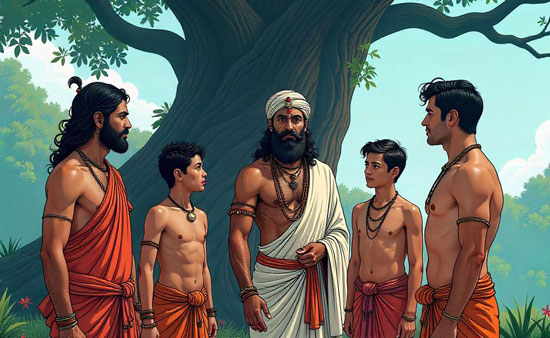The Wisdom of Varddhaman: A Cautionary Tale
Uncover the wisdom in the tale of Varddhaman's sons, where knowledge meets folly, showing that true understanding saves lives.
Tale of Varddhaman and His Sons in Jaysthal
The 21st Tale of Betal Pachisi
The spirit said, "Your majesty! there is a city named Jaysthal, the king of which was named Varddhaman. In his city was a Brahman named Vishnuswami, who had four sons; one a gambler, the second a lover of women, the third a fornicator, the fourth an atheist. The Brahman was one day admonishing his sons, saying, 'Wealth abides not in the house of him who gambles.' The gambler became greatly annoyed at hearing this. And he (the father) spoke again, saying, 'It is said in the Rajnit (or book of policy), Cut off the nose and ears of a gambler, and expel him from the land, so that others may not gamble; and although the gambler may have a wife and family in his house, do not consider them as in the house, for there's no knowing when he may lose them (at play). Again, those who are attracted by the wiles of courtesans purchase suffering for their own souls, while they part with their all under the influence of harlots, and take to stealing in the end. It is said, further, that wise men keep far away from such women as ensnare their hearts in a moment; whereas the unwise give up their hearts, and so lose all their honesty, good disposition, reputation, conduct, judgment, piety, and moral character. Moreover, the exhortation of their spiritual preceptors is unpalatable to them. It is also said that—When one has lost his own sense of shame, why should he fear to dishonour any one else? And there is a proverb to the effect that—When will the cat that devours its own young allow a rat to escape!' He went on to say, 'Those who do not acquire knowledge in their childhood, and who on attaining to manhood become engrossed in amorous pleasures, and continue to pride themselves on their youth,—those persons, in their old age, are consumed with regretful longings (for that which they have neglected in their youth).'"

"On hearing these words, all four of them came mutually to the decision that it was better for an ignorant man to die than live; and hence, it was best for them to visit some other land and study science. Determining on this, they went to another city, and after some time, having studied and become learned, they set out for their home. What do they see on the road but a Kanjar,1 who, after skinning and cutting up a dead tiger, and making a bundle of its bones, was about to take them away. Thereupon they said to one another, 'Come, let each of us put his knowledge to the proof.' Having determined on this, one of them called him (the Kanjar) and gave him something, and taking the bundle, sent him away; and, quitting the road, they opened the bundle. One of them arranged all the bones in their proper places, repeated an incantation and sprinkled something over them, so that they became united. In the same way the second brought the flesh together on the bones. The third, in the same manner, fixed the skin on the flesh. The fourth, in the same way, raised it to life. Thereupon it devoured the whole four of them as soon as it arose."
After reaching this point of the story, the spirit said, "Your majesty! who was the greatest fool of those four?" King Vikram replied, "He who restored it to life was the greatest fool. And it is said, that knowledge without wisdom is of no use whatever; on the contrary, wisdom is superior to learning; and those who lack wisdom die just as he who raised the tiger to life died." When the spirit heard these words, he went and suspended himself on that same tree. Again, did the king bind him, place him on his shoulder, and carry him away as before.
 Change Language:
Change Language:
Try out the other sections

 Craft Ideas for Kids
Craft Ideas for Kids Rhymes & Poems
Rhymes & Poems Benefits of Yoga for Kids
Benefits of Yoga for Kids School Projects & Homework Help
School Projects & Homework Help